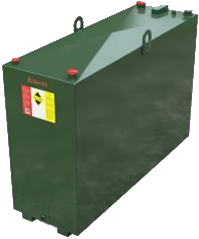Oil-Fired Central Heating Systems
Oil-fired heating systems, which uses fuel stored in an oil storage tank to heat your radiators and hot water, is becoming increasingly common in the United Kingdom.
The primary distinction between heating oil and mains gas is that heating oil is supplied by road and stored in a tank, which you may need to purchase or hire from a provider.
There are heat-only and combination condensing oil-fired boilers available. Instead of the instantaneous heating used in gas combi boilers, most oil-fired combination boilers have an internal hot water store to provide domestic hot water.

What Oil Tank do I need?
We stock EasyTank Oil Tanks in a collection of styles and sizes with configurations to meet the needs of both domestic and industrial installations, ranging from plastic, steel, bunded, single skin, underground, as well as several others.
Check out our Guides & Tips articles for more information on the various oil tanks and Oil Tank Regulations.
How does an Oil-Fired Heating System work?
Oil-fired heating is a cost-effective and simple way to heat your household. It functions like this:
-
- Fuel from the tank (generally kerosene in the UK) is pressurised and pumped into the boiler.
- The pressurised gasoline combines with the air to create a fine spray that is released into the combustion chamber.
- The oil is ignited by an electrode in the chamber, resulting in a highly effective burning flame.
- The hot exhaust gases travel into a heat exchanger (typically a copper wire), where the heat is converted into water that covers the wire.
- The heated water is then circulated around the house into radiators to provide heat and taps to provide hot water.
- To save fuel and improve performance, more advanced systems can automatically turn off when the target thermostat temperature is reached.
Oil Deliveries and Storage Tanks
Unlike gas, which is supplied via pipe networks, heating oil is delivered via a small tanker and deposited in an oil storage tank. That means you can easily track your fuel consumption and buy more fuel if required. You have the sole authority over when and how you use your fuel.
Rural locations and smaller communities also lack a nearby gas supply line; however, this is not an issue for homeowners who prefer to use heating oil.
Deliveries are accessible in even the most distant parts of the United Kingdom. There are thousands of sources of heating oil. Because of the competition among suppliers, you can always shop around and get a very good deal on your oil.
What are the pros and cons of Oil Fired Central Heating Systems?
What are the advantages of Oil Fired Central Heating Systems?
-
-
-
- If you live in a rural location that is not serviced by conventional gas lines, oil can be an effective solution since it can be delivered anywhere.
- Oil is an efficient fuel, particularly when used in the most recent modern boilers. If you have an old boiler, it is simple to replace.
- Oil is flammable, but it does not explode as easily as gas and does not emit carbon monoxide.
- Typically, oil-burning appliances can last over 30 years, whereas equivalent gas appliances are expected to last between 11 and 14 years.
-
-
What are the disadvantages of Oil Fired Central Heating Systems?
-
-
-
- The UK government has begun to phase out oil boilers, so that no new ones will be built after 2025, following the national strategy to be net-zero carbon by 2050.
- Installation from scratch is difficult and costly.
- Oil must be transported by lorry and poured into the tank, so make sure you have enough space for accessibility.
- You must keep an eye on the level in the tank and remember to order a refill before it runs dry.
- Your boiler and tank would need annual repairs.
- Oil is not the way to go if you want to be environmentally conscious. It emits much more carbon dioxide than coal.
-
-
Is it expensive to heat a home with oil?
Oil is an extremely efficient fuel. It has a higher temperature of combustion than natural gas. This ensures that you get a decent calorific return on every unit of energy you consume. Modern gas condensing boilers waste some of the hot flue gas produced, rendering them less effective.
Heating oil prices have only risen marginally since 2016. The estimated average annual cost of an oil-fired heating device in the United Kingdom is £830, according to which.co.uk. However, keep in mind that the age, size, and insulation of your house all have an impact on the cost of supplying heat and hot water.
As oil prices fluctuate, the cost of heating the fuel will also adjust. For example, the following are the costs per litre of kerosene heating oil over 5 years:
-
- In January 2016, the price was 32p.
- In January 2017, the price was 43p.
- In January 2018, the price was 48p.
- In January 2019, the price was 50p.
- In January 2020, the price was 52p
The life expectancy of oil heating appliances is another significant financial advantage of oil over gas. Oil-heating appliances can last for more than 30 years, while equivalent gas appliances can last between 11 and 14 years.
Is Oil Heating Safer?
All systems that use fuel to generate heat must meet applicable UK safety requirements. They should also be monitored and inspected regularly – always check the tank before refilling.
Oil, on the other hand, is flammable but not explosive like petrol. It also does not emit dangerous carbon monoxide when burned, so there is no need to be concerned with carbon monoxide poisoning incidents.
Are Oil Boilers going to be banned?
The UK government has begun the 2018 Clean Growth Strategy, where they intend to “phase out the installation of high carbon fossil fuel heating in new and existing homes currently off the gas grid.”
New homes must be constructed with low-carbon heating by 2025, but existing homes with oil heating will continue to use it.
The Federation of Petroleum Suppliers, the trade association for the heating oil distribution industry, believes that a sustainable, low-carbon liquid fuel or bio-fuel should be adopted as an off-grid home option. It claims that existing oil heating systems can function with this fuel, thus helping to decarbonize off-grid heating.



